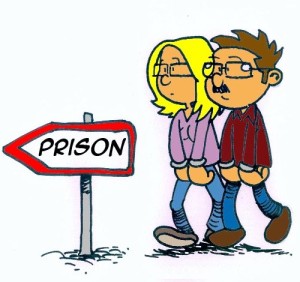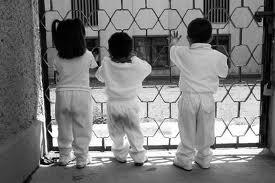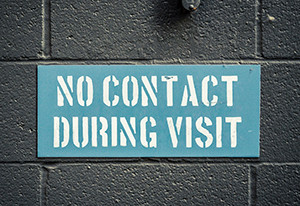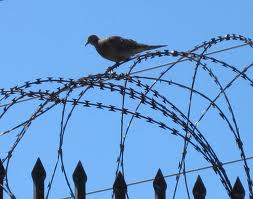When parents are in prison
March 24th, 2016 | Published in Economic (in)justice, Guest posts

Joan Beckwith with guest blogger Natasha Graham
What would it be like to have a parent in prison? How would it change everyday life? How would you go about dealing with systems such as courts, police and jails? What supports would be useful along the way?
These are important questions, and ones we might not think about unless we have been directly affected. They are not raised in general media as far as I am aware (Joan Beckwith), but were raised in a research project (now on hold) by co-author of this post, Tash (Natasha) Graham.
Tash encouraged me to use her literature review “in any way…[This] is a really important social issue and one that is often overlooked.”
I took her at her word and wrote this post, based on her material, and she agreed to be co-author. If academic sources are of interest, Tash can be contacted by scrolling to the ‘Comments’ section at the end of the post.
Background
About 38,000 children have a parent in prison in Australia each year, although records are incomplete. Gaps in record-keeping are matched by corresponding gaps in support services.
In America, more than 2.7 million children have at least one parent in  prison, and the experience is now so ‘normal’ that Sesame Street has developed a resource kit to guide children through rough times (click here).
prison, and the experience is now so ‘normal’ that Sesame Street has developed a resource kit to guide children through rough times (click here).
Some of the difficulties children face can include loss of support networks, family breakdown, economic hardship, social stigma, shame, and general lack of understanding of what they are going through.
Existing research focuses on intergenerational “risk”
Most existing research has looked at whether children with parents in prison are more likely to be imprisoned themselves. The focus has been on nature (genetic predisposition) and/or nurture (social learning in the family) to explain how crime reproduces from one generation to the next.
Broader social, political, cultural, and economic factors, beyond the individual, have been overlooked.
Poverty as a predictor of intergenerational crime, for example, has been  studied as a personal risk factor, and interventions have been developed to teach ‘poor’ people to manage their risk. Broader influences on poverty, such as inequitable access to quality education, affordable housing, and adequate health care (hence, ultimately, employment opportunities and the means for upward mobility) have been neglected.
studied as a personal risk factor, and interventions have been developed to teach ‘poor’ people to manage their risk. Broader influences on poverty, such as inequitable access to quality education, affordable housing, and adequate health care (hence, ultimately, employment opportunities and the means for upward mobility) have been neglected.
Politically popular policies (tough-on-crime approaches in particular) mean that more people go to prison and hence more children are affected. The glaring overrepresentation of Aboriginal people in prison means that Aboriginal children are also disproportionately affected. Providing support for these children is not a vote-winner however, and does not make the cut on policy agendas.
Additionally, children whose parents are imprisoned are not considered in legal frameworks in the sense that children whose parents get divorced are. Neither group of children is responsible for their family situation, and both could usefully be offered support. Effective support for children of imprisoned parents might well prevent transgenerational offending.
Interestingly, white collar crime is not viewed through the same intergenerational lens. It gets far less scrutiny overall, raising the possibility of class bias in available data. Quantifying such bias is, however, impossible from existing research that reduces intergenerational crime to individual risk factors, strips it of social context, and ignores a major category of crime (notably the corporate kind) directly linked to class.
The dominant reductionist approach suits governments. If individuals can be made responsible for their own predicaments, they can also be made responsible for getting out of them. There is, then, no requirement for anything to be done in the public policy arena.
Children who have parents in prison experience a social context that is more than the combination of genetic makeup and family experiences. They are also subject to family disruption, marginalisation, discrimination, social exclusion, stigma, economic hardship and disadvantage that go along with lack of understanding in the broader community and provide a breeding ground for shame.
These neglected factors create a knowledge gap that must be filled if children are to be effectively supported.

Peering into the knowledge gap
We need to learn more about what it is actually like to have a parent in prison, over and above whether it means children are more (or perhaps less) likely to follow parental precedent.
Inequality and associated social factors are also intergenerational, although much less recognised than the so-called personal risk factors.
As a community we need to improve the current circumstances and future outcomes for prisoners’ children. They have, after all, done nothing wrong and ultimately have the most to lose from continued social injustice.
Important social research but who will fund it?
There seems no doubt that understanding the experience of children whose parents are imprisoned is important social research. The question remains, who will do it and who will fund it?
Funding is particularly challenging under current political conditions that favour industry-university partnerships as the framework for research, with government grants being tied to a combination of “research excellence and income from industry”.
What “industry” is likely to fund research about children whose parents go to prison, you might wonder; or, for that matter, any research grounded in social justice imperatives? Seems unlikely, although it would be good to be proved wrong.

Your comments and suggestions are welcome
First-time comments have to be moderated. This process is normally completed within 24 hours. Do check back. Comments are greatly valued, always read, and mostly responded to. After your first comment, subsequent ones should appear automatically.
Social justice is for everyone (previously 2020socialjustice) is also on Facebook (click here)
And Twitter (click here)
Best Themis blessings



I was married to a corrupted policeman who Served a 4 year jail term. We had 3 boys, who at the time were aged 10,12,14. They are now aged 23, 22 and 19 and have turned out to be exceptional young men. My battle has been with the child support agency, the lands title office, the justice system and the family law courts, that have cost me $1000’s and made me feel as if I had committed the crime. I have stories to tell.
It sounds like you have done an exceptional job under exceptionally difficult circumstances with many roadblocks along the way and that your story could well be a book on its own, Alex. I wonder if you have considered writing it up as such?
There is also still a possibility that a research project could by developed by a person who expressed interest along the way, and if that does happen your contribution, along with others, would be invaluable.
Best wishes to you and your sons, and congratulations on having navigated the rocky territory.
Subsequent article about a US report on the effects on children of parental imprisonment http://www.colorlines.com/articles/report-how-parental-incarceration-impacts-our-kids
I have written an extensive 12-week personal development life coaching program around this issue, as well as other significant factors that precipitate reoffending and further family breakdown to be delivered in prisons. Slow process, no priority or serious responsibility from governmnet or the private sector to fund such programs, or facilitate any skills based programs for men particularly that would be advantageous to building their own business upon release where police checks don’t block them. Skills like personal training, concreting, brick laying etc. Not offered in prison. I founded the first skill certified hairdressing program in an Australian prison 10 years ago. Very successful. Since been axed. My son is himself a child of an incarcerated father & has no contact. Terribly shattering for him. The key is educating parents about understanding self, belief in self, behavioural science & giving them real skills for life & parenting, inside and out of prison. In fact prison is the perfect place to be educated. Their willingness for personal change is at highest level in prison.
Fantastic efforts on your part, Lisa. Very much appreciate all the points you have made, and sorry to hear about the axing of a successful program. Also, heart goes out to your son, and you. Hard journey for all involved…Joan Beckwith.
Hi Lisa,
That sounds like a fantastic program. We definitely need to and can do better to support prisoners and their families, especially the children involved. I never had a parent in prison but two of my older brothers were when I was a child. It is so difficult. I’m glad that your son has you for support, it sounds like you are doing a wonderful job!
Cheers,
Tash
I wonder if the 10 and 11 year olds who end up locked up in juvenile detention are actually the children of prisoners? I would like to study the social circumstances of these children and I don’t need funding as I am (semi) retired. My PhD was based on studying young prisoners in the Cook Islands so I am familiar with the field. The problem is getting permission from the detention centres, the child protection agencies and the families to talk to the children. Please pass on my email address to anyone who is interested. Meg mperkinsnsw@gmail.com
Hi Meg,
I’m a bit out of the loop in terms of permission processes, although I imagine it would also be useful to be affilitated with a university and hence with their associated ethics processes.
My question about the possibilities for such research in current times was partly rhetorical in terms of musing about the fate of all social research when the push from government is for university-industry partnerships. I can’t imagine industries that will take up this kind of issue that has no obvious commerial value (only potentially huge human value) and it worries me where this will lead.
I will alert Tash to your comment as she may have more useful ideas about contacts and possibilities for someone in your situation. I notice the “nsw” as part of your gmail address, and am guessing that might refer to your geographic location?
Anyway, it is good to have had people like you interested in pursuing the issues, and it would be excellent if something did eventuate…Joan Beckwith.
Hi Meg,
It would definitely be interesting to find out. I was not able to get ethics approval to speak to children directly through my university and it was difficult for me to get approval to interview adults who had a parent in prison when they were a child. That said, I know that other researchers within the fields of Social Work and Psychology have had success in this area. I have a background in Legal Studies/Social Inquiry. My concern is that governments (through a neoliberal lens) understand the individuals and their families to be the problem rather than addressing the issue within the social context in which it occurs. I would love to hear how you get on with this.
Cheers,
Tash
I worked with women in custody for a number of years and their mothering doesn’t cease when entering prison; in fact their trauma is further exacerbated by safety fears for their children. It’s beyond heartbreaking. I made a comment in an email to a high level person where I used to work regarding more trauma informed practice within our programs as the biggest advocate for preventing inter generational incarceration are mothers. They will pay it forward as they want the best for their kids…I was hauled over the coals for not following chain of command and completely ignored.
I no longer work in this environment but my passion for this issue remains. Any help I can offer albeit anecdotal, please let me know
Hi Trina, I am sorry (but, sadly, not surprised) to read of your experience with trying to mobilise change. Thanks for your offer of help. Someone who commented on the post on Twitter has expressed interest in possibly pursuing the research as part of a degree she is completing. I am hoping she follows that through and connects here to the website, in which case it might be possible to connect you together (although that would require an email address or other means of contact. You could provide that via the ‘Contact’ page or by email to 2020socialjustice@gmail.com if you prefer rather than putting it up here on the post)…Joan Beckwith.
Hi Trina,
You are absolutely right about the trauma that children face when a parent is incarcerated. Prison management is generally concerned with the safety and security of the prison so unfortunately, the treatment and well-being of prisoners’ children is overlooked. This occurs at all criminal justice levels from arrest, sentencing, imprisonment and post-release. It is fantastic that you have shown an interest in mothers and their children!
Cheers,
Tash
I believe that the children of prisoners are some of the most at risk in our society. Whilst recently facilitating parenting programs in prison I met so many women with so many child protection concerns for their children in care, both foster and family and no one listening to them. Their stories are heartbreaking. Children being raised by violent fathers whom the mother and her children were in hiding from before her incarceration. Children children being raised by dysfunctional family members that the parent had spent years escaping and children in less than ideal foster situations are just a few of the recurring themes. I don’t know who is responsible funding wise but I do know that as a society we can do better. The fact that some one is convicted of a crime shouldn’t mean that they can no longer advocate for or protect their children.
I agree, Frankie. We should be able to do better, and parents should be able to advocate for their children regardless of their personal circumstances. I wonder who needs to listen? It occurs to me that the least I could do would be to post this link, including your comment, on a few politicians’ websites…Joan Beckwith.
As a follow-up on your comment, Frankie, I have now sent an email to the (Acting) Minister for Corrections in Victoria. That seemed as good a place to start as any, and it is where I live, so if I do get a response it might be reasonably straightforward to follow up any leads provided. Here is a copy of what I sent to
robin.scott@parliament.vic.gov.au
Dear Acting Minister for Corrections, the Hon Robin Scott MP,
This recent article (link follows) raises questions about the support available to children who have parents in prison, and the shortage of research that considers imprisonment from their perspective.
Could you comment on any relevant research you are aware of, sources of funding for such research, and who you think might be in a position to do such research? The issue has raised considerable interest, and concern from those with personal and professional connections to affected children and parents.
If you are unable to help but can suggest alternative sources of information that would also be much appreciated.
Yours sincerely, Joan Beckwith (PhD)
……………………………
Email response 6 April 2016 (to my personal email) advising that my query passed on to Corrections Victoria to address.
………………………………
Letter received 25 May 2016 from Department of Justice and Regulation (Victoria) about prison-based programs for mothers and babies/children but does not address the needs in the community, particularly for older children in school who are not living with the parent in prison. https://www.2020socialjustice.com/wp-content/uploads/2016/03/Copy-of-CD-16-220271-Response-to-Joan-Beckwith-Research-and-support-for-children-with-parents-in-prison.pdf